The University of Utah’s College of Engineering continues to experience remarkable growth to meet the rising needs of Utah’s high-tech industries. This school year, 20 new faculty members have or will begin the next phase of their careers here. It is another example of the College meeting the challenge of producing more graduates for industries that are always looking for qualified new workers. Give these new faculty members a warm welcome if you pass them on campus.
Jessica Kramer (assistant professor, bioengineering) — 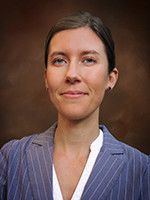 Jessica Kramer received her bachelor’s in biochemistry from the University of Utah and a doctorate in organic chemistry at the University of California, Los Angeles. Her main areas of research include biomaterials, cancer diagnostics and therapeutics, glycobiology, regenerative medicine, and drug delivery to the central nervous system.
Jessica Kramer received her bachelor’s in biochemistry from the University of Utah and a doctorate in organic chemistry at the University of California, Los Angeles. Her main areas of research include biomaterials, cancer diagnostics and therapeutics, glycobiology, regenerative medicine, and drug delivery to the central nervous system.
Lucas Timmins (assistant professor, bioengineering) — 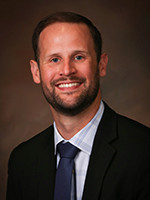 Lucas Timmins earned both his bachelor’s and doctorate in biomedical engineering at Texas A&M University. His research areas are in vascular biomechanics, computational and experimental biomechanics and medical device design.
Lucas Timmins earned both his bachelor’s and doctorate in biomedical engineering at Texas A&M University. His research areas are in vascular biomechanics, computational and experimental biomechanics and medical device design.
Michael Nigra (assistant professor, chemical engineering)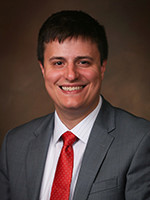 — Michael Nigra received his bachelor’s in chemical engineering and biomedical engineering from Carnegie Mellon University in Pittsburgh and his doctorate in chemical engineering from the University of California, Berkeley, in 2013. His research involves performing functional nanomaterial synthesis, characterization and applications testing. The majority of these materials have applications as catalysts for chemical and biochemical processes.
— Michael Nigra received his bachelor’s in chemical engineering and biomedical engineering from Carnegie Mellon University in Pittsburgh and his doctorate in chemical engineering from the University of California, Berkeley, in 2013. His research involves performing functional nanomaterial synthesis, characterization and applications testing. The majority of these materials have applications as catalysts for chemical and biochemical processes.
Tony Saad (assistant professor, chemical engineering) —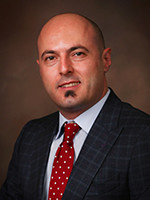 Tony Saad received his bachelor’s in mechanical engineering from Notre Dame University in 2003, a master’s in mechanical engineering from American University in Beirut, and a doctorate in mechanical engineering from the University of Tennessee Space Institute. Saad’s research is focused on developing numerical methods and simulation tools for studying variable density, multiphase and turbulent reacting flows.
Tony Saad received his bachelor’s in mechanical engineering from Notre Dame University in 2003, a master’s in mechanical engineering from American University in Beirut, and a doctorate in mechanical engineering from the University of Tennessee Space Institute. Saad’s research is focused on developing numerical methods and simulation tools for studying variable density, multiphase and turbulent reacting flows.
Thomas Zangle (assistant professor, chemical engineering)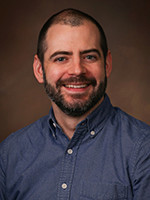 — Thomas Zangle received his bachelor’s in engineering sciences from Dartmouth College in 2005 and a master’s and doctorate in mechanical engineering from Stanford University. His research is in the development of technologies to evaluate the response of cancer cells to therapy. He also is examining mass transportation within single cells and developing microfluidic devices to extend the capabilities of current cell response measurements.
— Thomas Zangle received his bachelor’s in engineering sciences from Dartmouth College in 2005 and a master’s and doctorate in mechanical engineering from Stanford University. His research is in the development of technologies to evaluate the response of cancer cells to therapy. He also is examining mass transportation within single cells and developing microfluidic devices to extend the capabilities of current cell response measurements.
Huanan Zhang (assistant professor, chemical engineering)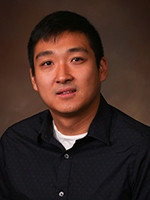 — Huanan Zang received his bachelor’s in chemical engineering from the Massachusetts Institute of Technology in 2008 and a master’s and doctorate in chemical engineering from the University of Michigan. His research is in the development of new nanomaterials for implantable electronics and designing nanobioelectronics for cellular modulation.
— Huanan Zang received his bachelor’s in chemical engineering from the Massachusetts Institute of Technology in 2008 and a master’s and doctorate in chemical engineering from the University of Michigan. His research is in the development of new nanomaterials for implantable electronics and designing nanobioelectronics for cellular modulation.
Gaby Ou (assistant professor, civil and environmental 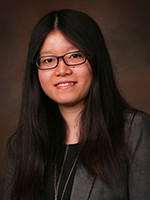 engineering) — Gaby Ou earned two bachelors, one in civil engineering from the University of Sydney in Australia and the other in theoretical and applied mechanics from Harbin Institute of Technology in China. She received her doctorate in structural engineering from Purdue University. Her research is in the infrastructural system performance assessment under extreme natural and man-made disasters using experimental and real world data.
engineering) — Gaby Ou earned two bachelors, one in civil engineering from the University of Sydney in Australia and the other in theoretical and applied mechanics from Harbin Institute of Technology in China. She received her doctorate in structural engineering from Purdue University. Her research is in the infrastructural system performance assessment under extreme natural and man-made disasters using experimental and real world data.
Jennifer Weidhaas (associate professor, civil and 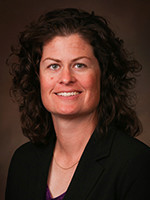 environmental engineering) — Jennifer Weidhaas earned her bachelor’s in civil engineering from Montana State University and a master’s and doctorate in civil and environmental engineering from the University of California, Davis. Her research is focused on biological processes and the fate and transport of contaminants and pathogens in the environment.
environmental engineering) — Jennifer Weidhaas earned her bachelor’s in civil engineering from Montana State University and a master’s and doctorate in civil and environmental engineering from the University of California, Davis. Her research is focused on biological processes and the fate and transport of contaminants and pathogens in the environment.
Mingyue Ji (assistant professor, electrical and computer 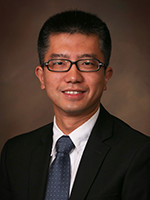 engineering) — Mingyue Ji received a bachelor’s in communication engineering from Beijing University of Posts and Telecommunications and two master’s degrees in electrical engineering, one from the University of California, Santa Cruz, and another from the Royal Institute of Technology in Stockholm, Sweden. He earned a doctorate in electrical engineering from the University of Southern California. His research is focused on communication and information theory, distributed storage and computing, wireless communications, signal processing, content delivery networks and machine learning.
engineering) — Mingyue Ji received a bachelor’s in communication engineering from Beijing University of Posts and Telecommunications and two master’s degrees in electrical engineering, one from the University of California, Santa Cruz, and another from the Royal Institute of Technology in Stockholm, Sweden. He earned a doctorate in electrical engineering from the University of Southern California. His research is focused on communication and information theory, distributed storage and computing, wireless communications, signal processing, content delivery networks and machine learning.
Mostafa Sahraei-Ardakani (assistant professor, electrical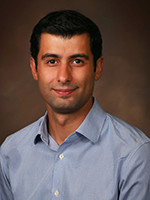 and computer engineering) — Mostafa Sahraei-Ardakani received a bachelor’s and master’s in electrical engineering from the University of Tehran and a doctorate in energy engineering from Pennsylvania State University. Sahraei-Ardakani’s research is focused on energy economics and policy, electricity markets and power system optimization.
and computer engineering) — Mostafa Sahraei-Ardakani received a bachelor’s and master’s in electrical engineering from the University of Tehran and a doctorate in energy engineering from Pennsylvania State University. Sahraei-Ardakani’s research is focused on energy economics and policy, electricity markets and power system optimization.
Henry Fu (associate professor, mechanical engineering) 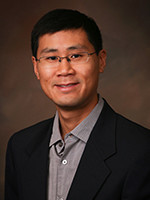 — Henry Fu earned a bachelor’s in chemistry and physics and a master’s in physics from Harvard University. He received his doctorate in physics from the University of California, Berkeley. His research is in complex biomaterials and low-Reynolds number hydrodynamics, including the solid and fluid mechanics of swimming microorganisms and microengineered systems.
— Henry Fu earned a bachelor’s in chemistry and physics and a master’s in physics from Harvard University. He received his doctorate in physics from the University of California, Berkeley. His research is in complex biomaterials and low-Reynolds number hydrodynamics, including the solid and fluid mechanics of swimming microorganisms and microengineered systems.
Owen Kingstedt (assistant professor, mechanical 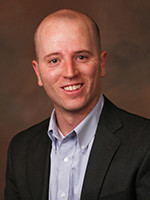 engineering) — Owen Kingstedt received his bachelor’s in mechanical engineering from Michigan Technological University and a master’s and doctorate in aerospace engineering from the University of Illinois at Urbana-Champaign. His research is in high-strain-rate mechanics, which is studied in vehicle crashes, ballistic impact and high-speed machining.
engineering) — Owen Kingstedt received his bachelor’s in mechanical engineering from Michigan Technological University and a master’s and doctorate in aerospace engineering from the University of Illinois at Urbana-Champaign. His research is in high-strain-rate mechanics, which is studied in vehicle crashes, ballistic impact and high-speed machining.
Tommaso Lenzi (assistant professor, mechanical 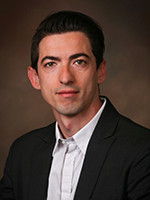 engineering) — Tommaso Lenzi completed his bachelor’s and master’s in biomedical engineering at the University of Pisa in Italy and a doctorate in biorobotics at Scuola Superiore Sant’Anna, also in Italy. His research is focused on mechatronics, control, biomechanics, and rehabilitation to advance robotics technologies to help those with physical disabilities.
engineering) — Tommaso Lenzi completed his bachelor’s and master’s in biomedical engineering at the University of Pisa in Italy and a doctorate in biorobotics at Scuola Superiore Sant’Anna, also in Italy. His research is focused on mechatronics, control, biomechanics, and rehabilitation to advance robotics technologies to help those with physical disabilities.
Steven Naleway (assistant professor, mechanical 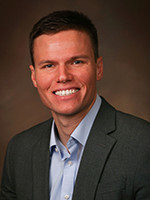 engineering) — Steven Naleway earned his bachelor’s in mechanical engineering and a master’s in materials science from Oregon State University. He later received his doctorate in materials science and engineering from the University of California, San Diego. His research focuses on the structural investigation of biological materials and the design and fabrication of bioinspired materials for structural and biomedical applications.
engineering) — Steven Naleway earned his bachelor’s in mechanical engineering and a master’s in materials science from Oregon State University. He later received his doctorate in materials science and engineering from the University of California, San Diego. His research focuses on the structural investigation of biological materials and the design and fabrication of bioinspired materials for structural and biomedical applications.
Pania Newell (assistant professor, mechanical engineering) 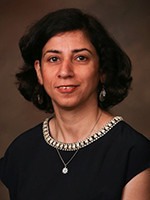 — Pania Newell graduated from Bahai Institute for Higher Education in Iran with a bachelor’s in civil engineering and earned a master’s in civil engineering from the University of New Mexico. She received her doctorate from the University of Colorado in Boulder, also in civil engineering. Her research mainly is in computational modeling of multi-physics, multi-scale systems and material modeling.
— Pania Newell graduated from Bahai Institute for Higher Education in Iran with a bachelor’s in civil engineering and earned a master’s in civil engineering from the University of New Mexico. She received her doctorate from the University of Colorado in Boulder, also in civil engineering. Her research mainly is in computational modeling of multi-physics, multi-scale systems and material modeling.
Mahdi Nazm Bojnordi (assistant professor, School of 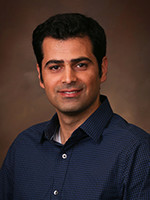 Computing) — Mahdi Nazm Bojnordi earned a bachelor’s in computer engineering from Shiraz University in Iran, master’s degrees in electrical and computer engineering from the University of Tehran in Iran and the University of Rochester in New York. He received a doctorate in computer architecture at the University of Rochester. His research interests are in computer architecture, new memory technologies, high-performance memory systems, and energy-efficient computing.
Computing) — Mahdi Nazm Bojnordi earned a bachelor’s in computer engineering from Shiraz University in Iran, master’s degrees in electrical and computer engineering from the University of Tehran in Iran and the University of Rochester in New York. He received a doctorate in computer architecture at the University of Rochester. His research interests are in computer architecture, new memory technologies, high-performance memory systems, and energy-efficient computing.
Srikumar Ramalingam (associate professor, School of 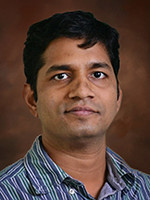 Computing) — Srikumar Ramalingam received his bachelor’s in computer science from Anna University in India and a master’s in computer science at the University of California, Santa Cruz. He earned his doctorate in computer science and applied mathematics at Inria Grenoble Rhône-Alpes in France. His research is focused on autonomous driving, robotics, computer vision, machine learning, computational photography, deep learning, graph algorithms, and discrete optimization.
Computing) — Srikumar Ramalingam received his bachelor’s in computer science from Anna University in India and a master’s in computer science at the University of California, Santa Cruz. He earned his doctorate in computer science and applied mathematics at Inria Grenoble Rhône-Alpes in France. His research is focused on autonomous driving, robotics, computer vision, machine learning, computational photography, deep learning, graph algorithms, and discrete optimization.
Bei Wang-Phillips (assistant professor, School of 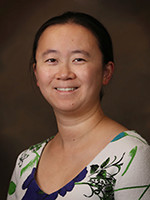 Computing) — Bei Wang-Phillips earned a bachelors in computer science and mathematics from the University of Bridgeport in Connecticut and a doctorate in computer science from Duke University. Her research is in topological data analysis, scientific visualization, information visualization, computational topology, computational geometry, computational biology and bioinformatics, machine learning, and data mining.
Computing) — Bei Wang-Phillips earned a bachelors in computer science and mathematics from the University of Bridgeport in Connecticut and a doctorate in computer science from Duke University. Her research is in topological data analysis, scientific visualization, information visualization, computational topology, computational geometry, computational biology and bioinformatics, machine learning, and data mining.
Jason Wiese (assistant professor, School of Computing) 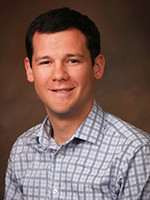 — Jason Wiese received a bachelor’s in computer science from the University of California, San Diego, and a doctorate in human computer interaction from Carnegie Mellon University. His research is focused on personal data and human-computer interaction.
— Jason Wiese received a bachelor’s in computer science from the University of California, San Diego, and a doctorate in human computer interaction from Carnegie Mellon University. His research is focused on personal data and human-computer interaction.
Michael Young (professor, Entertainment Arts & 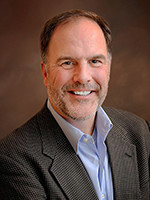 Engineering) — Michael Young received his bachelors in computer science at California State University, a master’s in computer science at Stanford University and a doctorate in intelligent systems at the University of Pittsburgh. He also is an adjunct professor of computer science at North Carolina State University where he leads the Liquid Narrative Research Group, and he’s the founder and co-director of the NCSU Digital Games Research Center. His research is focused on artificial intelligence, video games and interactive narrative.
Engineering) — Michael Young received his bachelors in computer science at California State University, a master’s in computer science at Stanford University and a doctorate in intelligent systems at the University of Pittsburgh. He also is an adjunct professor of computer science at North Carolina State University where he leads the Liquid Narrative Research Group, and he’s the founder and co-director of the NCSU Digital Games Research Center. His research is focused on artificial intelligence, video games and interactive narrative.